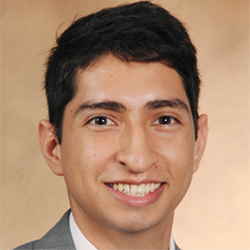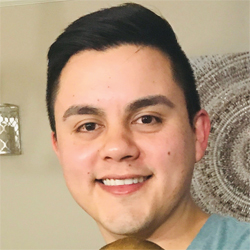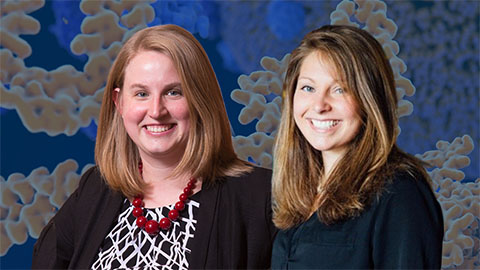SACNAS honors young scientists
The Society for Advancing Chicanos/Hispanics and Native Americans in Science, known as SACNAS, hosts the annual National Diversity in STEM Conference to support scientists in every stage of their educations and careers. At the conference, attendees present research, listen to keynote speakers, participate in workshops and network.
Student research presentations are a part of the conference’s mentoring program. Undergraduates present posters, while graduate students make oral presentations about their work. They receive constructive feedback and guidance from SACNAS mentors who help aspiring scientists from all backgrounds succeed in their education and careers.
The American Society for Biochemistry and Molecular Biology is among the sponsors of the student presentation awards, which honor the graduate students’ presentations in a number of disciplines. Here are the awardees from the 2018 conference in San Antonio who presented research in the ASBMB-sponsored categories of biochemistry and molecular biology.
SACNAS award winners
 Jonathan Hurtado Jonathan Hurtado
Jonathan Hurtado Jonathan Hurtado
Arizona State University
Hurtado is a fifth-year Ph.D. candidate in molecular and cellular biology at Arizona State University working in Qiang “Shawn” Chen’s lab in the Biodesign Center for Immunotherapy, Vaccines and Virotherapy. Hurtado presented his research on plant-produced, anti-dengue virus monoclonal antibodies’ ability to reduce antibody-dependent enhancement and to protect mice from dengue virus.
Hurtado wants to work as an academic faculty member.
 Patrick Cervantes Patrick Cervantes
Patrick Cervantes Patrick Cervantes
University of Wisconsin–Madison
Cervantes is a fourth-year Ph.D. candidate in cellular and molecular biology at the University of Wisconsin–Madison campus working in Laura Knoll’s lab in the department of medical microbiology and immunology. His research showed that Z-DNA binding protein 1 (ZBP1) is independent of necroptosis during Toxoplasma gondii infection.
Cervantes wants to work in private or government research.
 Jose (Joey) Luis Olmos Jr. Jose (Joey) Luis Olmos Jr.
Jose (Joey) Luis Olmos Jr. Jose (Joey) Luis Olmos Jr.
Rice University
Olmos is a fifth-year Ph.D. candidate in biochemistry and cellular biology at Rice University working in George N. Phillips Jr.’s lab. Olmos presented his collaborative work on time-resolved protein crystallography by mix-and-inject serial crystallography in the BioXFEL community, a National Science Foundation Science and Technology Center that, in part, aims to address the dynamic nature of proteins using X-ray free electron lasers.
Olmos wants to become a tenure-track professor because he is passionate about outreach and mentoring. “I believe science is a human endeavor that stands on the shoulders of giants,” he said, “and I find it very enjoyable and natural to give back by mentoring others on things that I’ve had to previously navigate or experience.”
Every summer, he helps recruit and mentor students for a summer research experience at Rice University that he co-directs with Phillips. Outside of the lab, Olmos enjoys reading and discovering new music.
Enjoy reading ASBMB Today?
Become a member to receive the print edition four times a year and the digital edition monthly.
Learn moreGet the latest from ASBMB Today
Enter your email address, and we’ll send you a weekly email with recent articles, interviews and more.
Latest in People
People highlights or most popular articles

Redefining lipid biology from droplets to ferroptosis
James Olzmann will receive the ASBMB Avanti Award in Lipids at the ASBMB Annual Meeting, March 7–10, just outside of Washington, D.C.

Creating change in biochemistry education
Pamela Mertz will receive the ASBMB William C. Rose Award for Exemplary Contributions to Education at the ASBMB Annual Meeting, March 7-10 in Washington, D.C.

Amacher, Pollock named Henry Dreyfus scholars
They were recognized for their outstanding research scholarship and a deep commitment to undergraduate education and each received $75,000 to fund their research.

Trainee mentorship as immortality
Suzanne Barbour will receive the ASBMB Sustained Leadership Award at the ASBMB Annual Meeting, March 7-10 in Washington, D.C.

Life in four dimensions: When biology outpaces the brain
Nobel laureate Eric Betzig will discuss his research on information transfer in biology from proteins to organisms at the 2026 ASBMB Annual Meeting.

Fasting, fat and the molecular switches that keep us alive
Nutritional biochemist and JLR AE Sander Kersten has spent decades uncovering how the body adapts to fasting. His discoveries on lipid metabolism and gene regulation reveal how our ancient survival mechanisms may hold keys to modern metabolic health.

